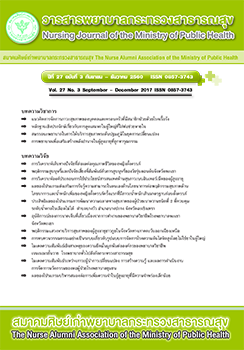Effects of a Perceived Self-Efficacy in Nutrition Enhancement Program on Nutrition Health Behavior and Weight Gain of Primigravida Pregnant Women with Pre-Pregnancy Overweight
Main Article Content
Abstract
This quasi-experimental research study aimed to investigate the effects of a perceived selfefficacy in nutrition enhancement program on nutrition health behavior and weight gain of primigravida pregnant women with pre-pregnancy overweight. Participants consisted of 60 women who received antenatal care services at Prabhuddabaht hospital, Saraburi province. The research instruments included 1) a perceived self-efficacy in nutrition enhancement program, 2) weighing scale, and 3) questionnaires of demographic data and nutrition behavior. The control group received routine care while the experimental group received both routine care and the program. Data were analyzed by frequency, percent, range, mean, standard deviation, Fisher’s exact test, chi-square test, Mann-Whitney U test, and t-test.
Results revealed that:
- the experimental group had a significantly higher difference in pre-posttest mean score for nutrition health behavior than the control group (t=9.22, p<.001);
- the experimental group had a higher mean score of nutrition health behavior after experiment than that of before experiment (t=11.67, p< .001); and
- the experimental group had a mean weekly weight gain different from that of the control group (t= -8.12, p<.001).
Nurses responsible for an antenatal care clinic should be trained about nutrition in pre-pregnancy overweight women. They should then apply this program to the care of these pregnant women. This may help these women become empowered to improve their nutrition health behaviors.
Article Details
บทความและรายงานวิจัยในวารสารพยาบาลกระทรวงสาธารณสุข เป็นความคิดเห็นของ ผู้เขียน มิใช่ของคณะผู้จัดทำ และมิใช่ความรับผิดชอบของสมาคมศิษย์เก่าพยาบาลกระทรวงสาธารณสุข ซึ่งสามารถนำไปอ้างอิงได้
References
2. Aekplakorn W. Prevalence of overweight and obesity in Thailand [Internet]. 2013 [Cited 2013 June 21]. Available from: http://raipoong.com/media/news_file/270-ระบาดวิทยาของภาวะอ้วนและอ้วนลงพุงในประเทศไทย-20130621112044.pdf(in Thai).
3. Christakis NA, Fowler JH. The spread of obesity in a large social network over 32 years. New England Journal of Medicine 2007;4:370-9.
4. Ruth SM, Woo J. Prevention of overweight and obesity: How effect is the current public health approach. International Journal of Environmental Research and Public Health 2010;7:765-83.
5. Arora R, Arora D, Patunamond J. Adverse pregnancy outcomes in women with high pre-pregnancy body mass index. Open Journal of Obstetrics and Gynecology 2013;3,285-91.doi:10.4236/ojog.2013.32053
6. Ovesen P, Rasmussen S, Kesmodel U. Effect of pregnancy maternal overweight and obesity on pregnancy outcome. The American College of Obstetrics and Gynecology 2011;2,305-12.
7. Bandura A. Recycling misconceptions of perceived self-efficacy. Cognitive Therapy and Research 1984;8,231-55.
8. Bandura A. Social foundation of thought and action: A social cognitive theory. Englewood Cliffs (NJ): Prentice Hall; 1986.
9. Srisatidnarakul B. Methodology of nursing research. Bangkok: You & I Inter Media; 2010.(in Thai).
10. Ampat C, Wichakul P, Wichianprapa A. The relationship between perceived self-efficacy and health behaviors during childbirth among first time mothers [Research report]. Chanthaburi:Phrapokklao Nursing College; 2010.(in Thai).
11. Plangwan W, Wattananukulkiat S. Effects of self-efficacy enhancement program on nutritional health behavior of pregnant adolescents. Journal of Nurses’ Association of Thailand, North-Eastern Division 2012;3(2),16-22.(in Thai).
12. Mungkamanee S. The effect of using the perceived self-efficacy promoting program in self care on health promoting behavior of primigravida adolescents [Master thesis]. Bangkok: Chulalongkorn University; 2004.(in Thai).
13. Institute of Medicine. Weight gained during pregnancy: Reexamining the guidelines. Washington, DC: National Academy; 2009.
14. Roach JB, Yadrick MK, Johnson JT, Boudreaux LJ, Forsythe WA, Billon W. Using selfefficacy to predict weight loss among young adults. Journal of the American Dietetic Association 2003;103,1357-9.
15. Warziski MT, Sereika SM, Styn MA, Music E, Burke LE. Changes in self-efficacy and dietary adherence: The impact on weight loss in the PREFER study. Journal of Behavioral Medicine 2008;31,81-92.
